I am trying to create the war card game where 2 players draw a card each on the table, and the player whose card has max value gets both the cards, if the card values are equal(called war condition) each player draws 5 cards, and the value of the last card among these 5 cards are compared and works similarly as above. A player wins when either the other player runs out of cards or if in war condition the other player has less than 5 cards.
My questions:
- When I am running the game logic sometimes it runs but sometimes it gets stuck in an infinite loop. Why?
- I can notice that when the total number of cards for both players at all times should be 52, but here it is decreasing. Why? (I can see that the cards are getting lost every time the game goes into war condition, but I am not able to understand why that is happening, since I am adding all the 10 cards to the player whose card has a greater value.)
I have tried another method where I assume that players are always at war and then approach it, which works. But I want to understand why, if I break it into steps which I am trying to do here, is it not working?
Code:
import random
suits = ['Hearts','Clubs','Spades','Diamonds']
ranks = ['Two','Three','Four','Five','Six','Seven','Eight','Nine','Ten','Jack','Queen','King','Ace']
values = {'Two': 2, 'Three': 3, 'Four': 4, 'Five': 5, 'Six' : 6 , 'Seven' :7, 'Eight': 8,'Nine':9,
'Ten':10,'Jack':11, 'Queen': 12,'King': 13,'Ace':14 }
classes:
class Card():
def __init__(self,suit,rank):
self.suit = suit
self.rank = rank
self.value = values[rank]
#string method
def __str__(self):
return self.rank + ' of ' + self.suit
class Deck():
def __init__(self):
self.all_cards = [] #list of objects
for suit in suits:
for rank in ranks:
#create card object
created_card = Card(suit,rank)
self.all_cards.append(created_card)
def shuffle(self): #method to shuffle the card
random.shuffle(self.all_cards)
def deal_one(self):
return self.all_cards.pop() #we want the last card from deck
class Player():
def __init__(self,name):
self.name = name
self.all_cards = []
def remove_one(self):
return self.all_cards.pop(0) #to remove card from beginning of the list
def add_cards(self,new_cards):
if type(new_cards) == type([]):
self.all_cards.extend(new_cards)
else:
self.all_cards.append(new_cards)
def __str__(self):
return f'Player {self.name} has {len(self.all_cards)} cards.'
And below is the final game logic:
#create 2 new instances of the player class
player1_name = input('Enter the name of Player1: ')
player2_name = input('Enter the name of Player2: ')
player1 = Player(player1_name)
player2 = Player(player2_name)
newdeck = Deck()
newdeck.shuffle()
#splitting the deck among the two players - alternate card from deck goes to each player respectively
for i in range(0,len(newdeck.all_cards)-1,2):
player1.add_cards(newdeck.all_cards[i])
player2.add_cards(newdeck.all_cards[i+1])
#for x in range(26):
# player1.add_cards(newdeck.deal_one())
#player2.add_cards(newdeck.deal_one())
print(player1)
print(player2)
game_status = True
round_num = 0
while game_status == True:
round_num +=1
print(f"Round {round_num}")
if len(player1.all_cards) == 0:
print('Player 1 out of cards'+ player2.name + 'Wins!')
game_status = False
break
if len(player2.all_cards) == 0:
print('Player 2 out of cards' + player1.name + 'Wins!')
game_status = False
break
else:
player_cards = []
player1_card = player1.remove_one()
player2_card = player2.remove_one()
player_cards.append(player1_card)
player_cards.append(player2_card)
print('player1_card_value: ',player1_card.value)
print('')
print('player2_card_value: ',player2_card.value)
print('')
print(player1)
print('')
print(player2)
at_war = True
if player1_card.value == player2_card.value:
while at_war == True:
player1_list = []
player2_list = []
card_list = []
if len(player1.all_cards) < 5:
print('Player 2 won')
game_status = False
at_war = False
break
elif len(player2.all_cards) <5:
print('Player 1 won')
game_status = False
at_war = False
break
if len(player1.all_cards) >= 5 and len(player2.all_cards) >= 5:
for i in range(5):
player1_list.append(player1.remove_one())
player2_list.append(player2.remove_one())
card_list.extend(player1_list)
card_list.extend(player2_list)
print("CARD LIST LEN", len(card_list))
if player1_list[0].value > player2_list[0].value:
player1.add_cards(card_list)
at_war = False
break
elif player1_list[0].value < player2_list[0].value:
player2.add_cards(card_list)
#player2.add_cards(player1_list)
at_war = False
break
else:
at_war = True
elif player1_card.value > player2_card.value:
player1.add_cards(player_cards)
#player1.add_cards(player2_cards)
#print('p1>p2', player1)
elif player2_card.value > player1_card.value:
player2.add_cards(player_cards)
print(player1)
print(player2)
if len(player1.all_cards) == 0:
print('Player 2 won')
elif len(player2.all_cards) == 0:
print('Player 1 won')
Output: When it was stuck in an infinite loop:(You can see the total number of cards is now 34 instead of 52.)
